Your search “com16501.content.olc.org/com/ref/collection/criminal/did/154 ”
Document(s)
Roper and Race: the Nature and Effects of Death Penalty Exclusions for Juveniles and the “Late Adolescent Class”
By Craig Haney, Frank R. Baumgartner and Karen Steele, on 20 October 2022
2022
Academic report
United States
More details See the document
In Roper v. Simmons (2005), the US Supreme Court raised the minimum age at which someone could be subjected to capital punishment, ruling that no one under the age of 18 at the time of their crime could be sentenced to death. The present article discusses the legal context and rationale by which the Court established the current age-based limit on death penalty eligibility as well as the scientific basis for a recent American Psychological Association Resolution that recommended extending that limit to include members of the “late adolescent class” (i.e., persons from 18 to 20 years old). In addition, we present new data that address the little-discussed but important racial/ethnic implications of these age-based limits to capital punishment, both for the already established Roper exclusion and the APA-proposed exclusion for the late adolescent class. In fact, a much higher percentage of persons in the late adolescent class who were sentenced to death in the post-Roper era were non-White, suggesting that their age-based exclusion would help to remedy this problematic pattern.
- Document type Academic report
- Countries list United States
Document(s)
Reforming Criminal Justice
By Arizona State University (ASU), on 1 January 2017
2017
Academic report
More details See the document
Reforming Criminal Justice is a four-volume report meant to enlighten reform efforts in the United States with the research and analysis of leading academics. Broken down into individual chapters—each authored by a top scholar in the relevant field—the report covers dozens of topics within the areas of criminalization, policing, pretrial and trial processes, punishment, incarceration, and release. The chapters seek to enhance both professional and public understanding of the subject matter, to facilitate an appreciation of the relevant scholarly literature and the need for reform, and to offer potential solutions. The ultimate goal is to increase the likelihood of success when worthwhile reforms are debated, put to a vote or otherwise considered for action, and implemented in the criminal justice system.
- Document type Academic report
- Themes list Due Process , Fair Trial, Legal Representation, Death Penalty,
Document(s)
Caught in a Web Treatment of Pakistanis in the Saudi Criminal Justice System
By Human Rights Watch / Justice Project Pakistan, on 8 September 2020
2020
NGO report
Pakistan
More details See the document
Report about the treatment of Pakistanis in the Saudi criminal justice system
- Document type NGO report
- Countries list Pakistan
- Themes list Discrimination, Foreign Nationals,
Document(s)
Wrongful Convictions and the Culture of Denial in Japanese Criminal Justice
By David T. Johnson / The Asia-Pacific Journal, on 1 January 2015
2015
Article
Japan
More details See the document
The release of Hakamada Iwao from death row in March 2014 after 48 years of incarceration provides an opportunity to reflect on wrongful convictions in Japanese criminal justice. My approach is comparative because this problem cannot be understood without asking how Japan compares with other countries: to know only one country is to know no country well. Comparison with the United States is especially instructive because there have been many studies of wrongful conviction there and because the U.S. and Japan are the only two developed democracies that retain capital punishment and continue to carry out executions on a regular basis. On the surface, the United States seems to have a more serious problem with wrongful convictions than Japan, but this gap is more apparent than real. To reduce the problem of wrongful convictions in Japanese criminal justice, reformers must confront a culture of denial that makes it difficult for police, prosecutors, and judges to acknowledge their own mistakes.
- Document type Article
- Countries list Japan
- Themes list Fair Trial, Innocence,

Member(s)
Citizens United for Rehabilitation of Errants (CURE)
on 30 April 2020
Citizens United for Rehabilitation of Errants (CURE) is a grassroots organization that was founded in Texas in 1972. It became a national organization in 1985. CURE believes that prisons should be used only for those who absolutely must be incarcerated and that those who are incarcerated should have all of the resources they need to […]
2020
United States
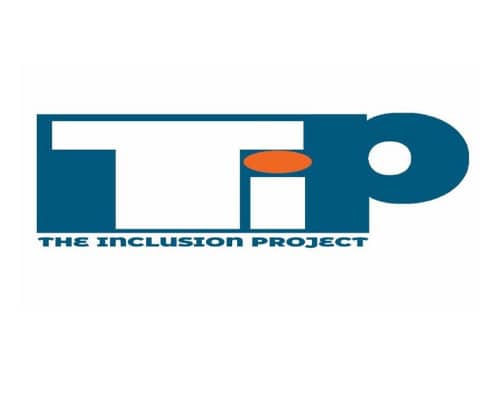
Member(s)
The Inclusion Project
on 13 September 2024
The Inclusion Project (TIP) is a legal services provider founded in 2019 and registered in Nigeria as The Inclusion Project.
2024
Nigeria
Document(s)
Cuba – Committee Against Torture – Death Penalty – March 2022
on 21 March 2022
2022
NGO report
World Coalition
Cruel, Inhuman and Degrading Treatment and Punishment
Cuba
More details Download [ pdf - 250 Ko ]
Cuba has maintained a de facto moratorium on the imposition of the death penalty since its last reported execution in 2003. In 2010, Cuba’s Supreme Court commuted the death sentence of Cuba’s last remaining death row inmate. As of the date of this report, there is no record of an individual currently sentenced to death. Although a de facto moratorium is in place, Cuba has not committed to a de jure abolition of the death penalty, citing national security concerns.
- Document type NGO report / World Coalition
- Countries list Cuba
- Themes list Cruel, Inhuman and Degrading Treatment and Punishment
Document(s)
Maldives – Committee Against Torture (LOIPR) – Death Penalty – June 2022
By The Maldivian Democracy Network (MDN) , on 21 July 2022
2022
NGO report
World Coalition
Cruel, Inhuman and Degrading Treatment and Punishment
Maldives
More details Download [ pdf - 1443 Ko ]
This report addresses the Maldives’ compliance with its human rights obligations with respect to the death penalty. Despite its long-standing, de facto moratorium on executions, the Maldives sentenced two people to death in 2019, after sentencing no one to death in 2018.[1] At the end of 2019, there were 19 people on death row in the Maldives – three of whom had exhausted their appeals and five of whom were juveniles when the crime was committed.[2] The Maldives sentenced another individual to death in 2022, which represented the first time the country sentenced a foreign national to death.[3] The continued use of the death penalty in sentencing is particularly concerning given evidence of due process violations, including the use of torture to obtain confessions, the lack of effective and accessible complaint mechanisms for detained individuals, the lack of an independent judiciary, and the use of the death penalty as a sentence for crimes committed by juveniles.
- Document type NGO report / World Coalition
- Countries list Maldives
- Themes list Cruel, Inhuman and Degrading Treatment and Punishment
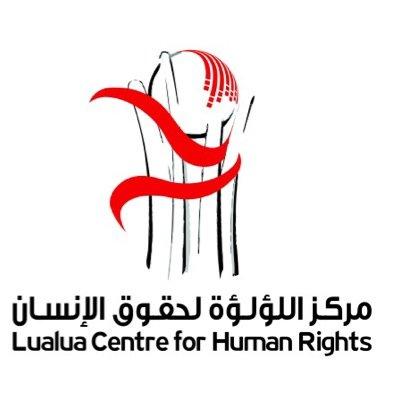
Member(s)
Lualua Center for Human Rights
on 30 April 2020
The objectives of Lualua Center for Human Rights are: 1- To contribute in the promotion of economic, social, cultural, environmental and civil growth according to the international declaration of human rights and subsequent relevant international conventions. 2- To work on achieving integrity and transparency and fighting corruption. To enshrine the concept of citizenship by promoting […]
2020
Lebanon
Document(s)
Intiatives World Day 2005
By World coalition against the death penalty , on 10 October 2005
2005
Campaigning
Trend Towards Abolition
frMore details See the document
Intiatives World Day 2005
- Document type Campaigning
- Themes list Trend Towards Abolition
- Available languages Initiatives journée mondiale 2005
Document(s)
Philippines – Committee on the Elimination of Discrimination Against Women – Death Penalty – June 2022
on 21 July 2022
2022
NGO report
Philippines
Women
More details Download [ pdf - 443 Ko ]
The Government of the Philippines has taken commendable steps toward protecting and promoting the rights of women overseas Filipino workers (OFWs), but those workers remain vulnerable to exploitation and abuse, and when they come into conflict with the law in their host countries, their vulnerabilities are compounded by linguistic and legal barriers, as well as judicial systems which fail to account for the gendered context in which they allegedly committed criminal acts. The Government of the Philippines should do more to ensure protection of the rights of these women OFWs, particularly when they are at risk of being sentenced to death.
- Document type NGO report
- Countries list Philippines
- Themes list Women
Document(s)
How Families of Murder Victims Feel Following the Execution of Their Loved One’s Murderer: A Content Analysis of Newspaper Reports of Executions from 2006-2011
By Journal of Qualitative Criminal Justice and Criminology, on 1 January 2013
2013
Working with...
More details See the document
By Corey Burton and Richard Tewksbury
- Document type Working with...
- Themes list Public debate, Murder Victims' Families, Death Penalty, Country/Regional profiles,
Document(s)
Capital Punishment A Hazard to a Sustainable Criminal Justice System?
By Ashgate Publishing / Lill Scherdin, on 8 September 2020
2020
Book
More details See the document
This book questions whether the death penalty in and of itself is a hazard to a sustainable development of criminal justice. As most jurisdictions move away from the death penalty, some remain strongly committed to it, while others hold on to it but use it sparingly. This volume seeks to understand why, by examining the death penalty’s relationship to state governance in the past and present. It also examines how international, transnational and national forces intersect in order to understand the possibilities of future death penalty abolition.The chapters cover the USA – the only western democracy that still uses the death penalty – and Asia – the site of some 90 per cent of all executions. Also included are discussions of the death penalty in Islam and its practice in selected Muslim majority countries. There is also a comparative chapter departing from the response to the mass killings in Norway in 2011. Leading experts in law, criminology and human rights combine theory and empirical research to further our understanding of the relationships between ways of governance, the role of leadership and the death penalty practices.
- Document type Book
- Themes list Due Process , International law, Trend Towards Abolition,
Document(s)
The Dark At the Top of the Stairs: Four Destructive Influences of Capital Punishment on American Criminal Justice
By David T. Johnson / Franklin Zimring / Social Science Research Network , on 1 January 2011
2011
Academic report
More details See the document
Executionhas also (1) had a powerful negative influence on the substantive criminal law; (2) promoted the practice of using extreme penal sanctions as status rewards to crime victims and their families; (3) provided moral camouflage for a penalty of life imprisonment without possibility of parole, which is almost as brutal as state killing; and (4) diverted legal andjudicial resources from the scrutiny of other punishments and governmental practicesin an era of mass imprisonment. This chapter discusses these four latent impacts of attempts to revive and rationalize the death penalty in the United States.
- Document type Academic report
- Themes list Arbitrariness,
Document(s)
The State of Criminal Justice 2011
By American Bar Association / Ronald Tabak, on 1 January 2011
NGO report
More details See the document
The State of Criminal Justice 2011 contains a chapter on death penalty by Ronald Tabak (Ch. 19). Tabak explores legislative changes, the declining use of the death penalty, important Supreme Court decisions and the adequacy of representation.
- Document type NGO report
Document(s)
United Nations Principles and Guidelines on Access to Legal Aid in Criminal Justice Systems
By Economic and Social Council, on 1 January 2012
2012
United Nations report
enarrufresMore details See the document
Resolution adopted by the Economic and Social Council [on the recommendation of the Commission on Crime Prevention and Criminal Justice (E/2012/30 and Corr.1 and 2)]
- Document type United Nations report
- Themes list International law,
- Available languages Japanese : 联合国关于在刑事司法系统中获得法律援助机会的 原则和准则"مبادئ الأمم المتحدة وتوجيهاا بشأن سبل الحصول على /٢٠١٢ المساعدة القانونية في نظم العدالة الجنائية"Принципы и руководящие положения Организации Объединенных Наций, касающиеся доступа к юридической помощи в системах уголовного правосудияPrincipes et lignes directrices des Nations Unies sur l’accès à l’assistance juridique dans le système de justice pénalePrincipios y directrices de las Naciones Unidas sobre el acceso a la asistencia jurídica en los sistemas de justicia penal
Document(s)
Muzzling critical voices: Politicized trials before Saudi Arabia’s Specialized Criminal Court
By Amnesty International, on 8 September 2020
2020
NGO report
Saudi Arabia
aresarfrMore details See the document
Despite the Saudi Arabian authorities’ rhetoric about reforms, they have unleashed an intense crackdown on citizens promoting change in the last few years. One of the instruments of that repression has been the Specialized Criminal Court (SCC), which was set up in 2008 to try individuals accused of terror-related crimes. Amnesty International has documented the cases of 95 individuals who were tried before the SCC between 2011 and 2019. It has concluded that the SCC’s judges have presided over grossly unfair trials, handing down prison sentences of up to 30 years and numerous death sentences, in an effort to silence dissent.
- Document type NGO report
- Countries list Saudi Arabia
- Themes list Country/Regional profiles, Terrorism,
- Available languages AR Muzzling critical voicesArabia Saudí: Silenciar las voces críticas: Juicios politizados ante el Tribunal Penal Especializado de Arabia Saudí - Resumen ejecutivo y conclusionesتكميم الأفواه المعارِضة: محاكمات مسيّسة أمام المحكمة الجزائية المتخصصة في السعوديةArabie Saoudite: Reduire les voix critiques au silence: Des proces politises devant le Tribunal penal special en Arabie Saoudite
Document(s)
Detailed Factsheet
By World coalition against the death penalty , on 10 October 2011
2011
Campaigning
Trend Towards Abolition
frMore details Download [ pdf - 201 Ko ]
Detailed Factsheet 2019
- Document type Campaigning
- Themes list Trend Towards Abolition
- Available languages Fiche détaillée 2011
Member(s)
Coordination Eveil et cause pour l’Unité nationale et la lutte contre l’esclavage
on 30 April 2020
The Coordination Eveil et cause pour l’Unité nationale et la lutte contre l’eclavage is a non-governmental organization focused on the fight against slavery and its aftereffects. Created on 22 February 2012, it promotes a culture of Human rights and strenghten the national unity and and the bonds of love and brotherhood between every part of […]
2020
Mauritania
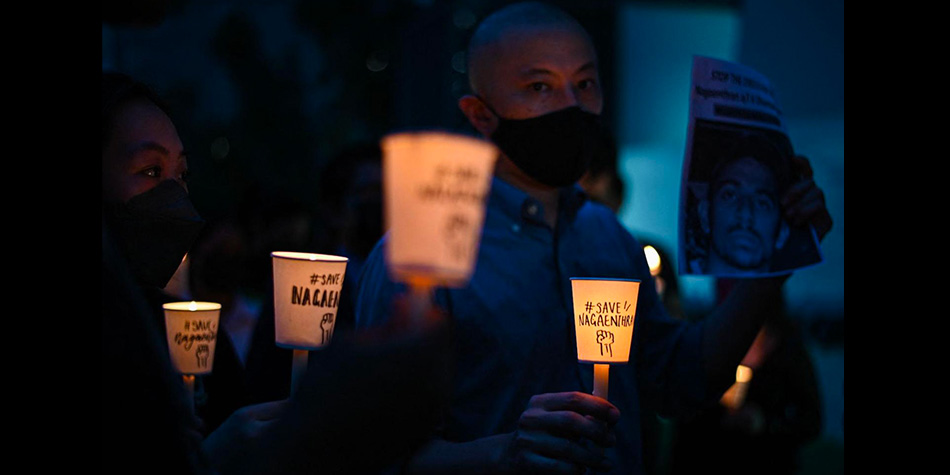
Article(s)
Death penalty: Singapore’s growing abolition movement
By Kirsten Han, on 5 September 2022
Article first published by the Interpreter Public support for capital punishment isn’t as overwhelmingand unshakeable as the government often portrays it to be.
2022
Singapore
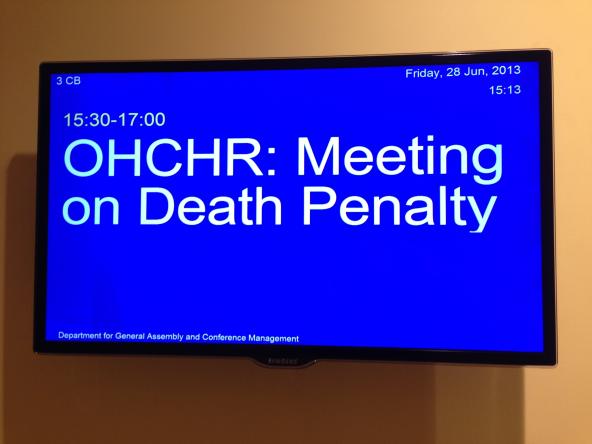
Article(s)
United Nations panel hears from innocent sentenced to death
By Maria Donatelli, on 4 July 2013
World Coalition members and a man who spent 18 years on death row for murders he did not commit joined UN Secretary General Ban Ki-Moon for a debate on capital punishment.
2013
Innocence
United States
Document(s)
DPIC Special Report: The Innocence Epidemic
By Death Penalty Information Center, on 20 July 2022
2022
NGO report
Innocence
United States
More details See the document
A Death Penalty Information Center Analysis of 185 Death-Row Exonerations Shows Most Wrongful Convictions Are Not Merely Accidental.
- Document type NGO report
- Countries list United States
- Themes list Innocence
Document(s)
End of its Robe: How Killing the Death Penalty can Revive Criminal Justice
By Brandon L. Garrett , on 1 January 2017
2017
Book
United States
More details See the document
Brandon Garrett hand-collected and analyzed national data, looking for causes and implications of this turnaround. End of Its Rope explains what he found, and why the story of who killed the death penalty, and how, can be the catalyst for criminal justice reform.
- Document type Book
- Countries list United States
- Themes list Due Process , Public debate, Death Penalty, Country/Regional profiles,
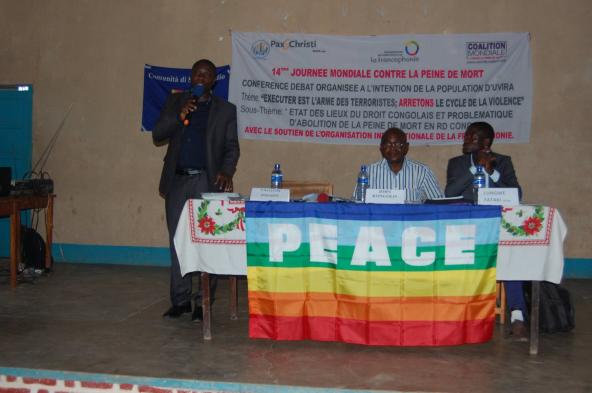
Article(s)
Towards the abolition of the death penalty in DRC: advances to be confirmed
By Olivier LUNGWE FATAKI - Pax Christi Uvira, on 13 December 2016
To date, the Democratic Republic of the Congo maintains the death penalty in its legislation. The proponents of the capital punishment argue that it remains an efficient tool for deterrence in general as well as a solution to the recurring criminal phenomenon hitting the country’s Eastern part.
2016
Democratic Republic of the Congo
Moratorium
Public Opinion

Member(s)
Death Penalty Research Unit (DPRU), University of Oxford
on 15 December 2023
The Death Penalty Research Unit has three main aims: to develop empirical, theoretical and policy-relevant research on the death penalty worldwide; to encourage death penalty scholarship including at graduate level, through education, events, research dissemination and an active blog; and to engage in knowledge production, exchange and dissemination in cooperation with civil society, charities, legal […]
2023
United Kingdom
Document(s)
Will Wrongful Convictions Be a Catalyst for Change in Japanese Criminal Justice?
By David T. Johnson / The Asia-Pacific Journal / Matthew Carney, on 1 January 2015
2015
Article
Japan
More details See the document
This article is a written explanation of the 12-minute Australian Broadcasting Corporation video of the same name.
- Document type Article
- Countries list Japan
- Themes list Fair Trial, Trend Towards Abolition, Innocence,
Document(s)
Drug-related Offences, Criminal Justice Responses and the Use of the Death Penalty in South-East Asia
By Office of the United Nations High Commissioner for Human Rights, on 1 January 2019
2019
International law - United Nations
More details See the document
Most of the world’s countries or territories have either abolished the death penalty or no longer use it. More than half of those that retain the death penalty, of which many are in South-East Asia, do so for drug-related offences. Most prisoners on death row in South-East Asia have been convicted of drug-related offences, although law and practice vary considerably among countries that retain the death penalty.
- Document type International law - United Nations
- Themes list Death Penalty, Statistics,
Article(s)
UN receives five million signatures in favour of a moratorium on executions
on 8 November 2007
A delegation of World Coalition member organisations has handed over the petition to United Nations General Assembly president Srgjan Kerim.
2007
Moratorium
Article(s)
Program Manager
By World Coalition Against the Death Penalty, on 15 October 2018
The World Coalition Against the Death Penalty recruits a program manager for a full time permanent position starting in January 2019.
2018
Article(s)
Finance and Administration Manager
By World Coalition Against the Death Penalty, on 14 May 2020
The World Coalition Against the Death Penalty recruits a Finance and Administration Manager for a full time permanent position starting as soon as possible.
2020
Article(s)
Logistics and Partnership Manager
By World Coalition Against the Death Penalty, on 3 February 2020
The World Coalition Against the Death Penalty recruits a logistics and partnership manager for a full time permanent position starting as soon as possible.
2020
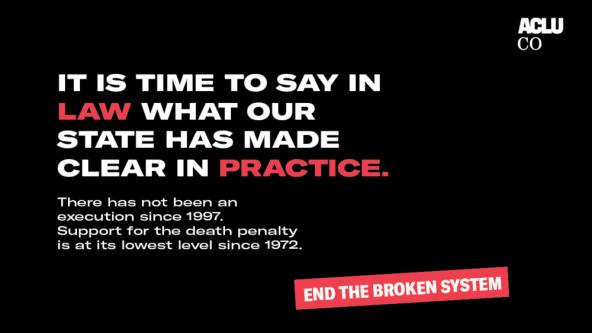
Article(s)
How Colorado became the 22nd abolitionist State in the USA
By Aurélie Plaçais, on 30 March 2020
On March 23 2020, the Governor of the State of Colorado, Jared Polis, signed legislation abolishing the death penalty. The bill SB20-100 had passed the Senate by a 19-13 vote on January 30 and the House by a 38-27 vote on February 26. He also commuted the sentences of the three people on death row […]
2020
United States
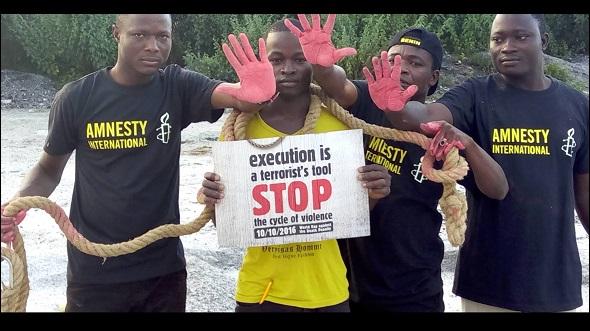
Article(s)
Africa raises its voice against the death penalty
By Tiziana Trotta, on 21 October 2016
Many African organizations and institutions raised their voices on the occasion of the 14th World Day against the Death Penalty, whose last edition, celebrated on October 10, was dedicated to the use of death penalty for terrorism-related crimes.
2016
Terrorism
Article(s)
World Day: everybody stands up against the death penalty!
on 27 September 2007
The 5th World Day Against the Death Penalty takes place on Wednesday, 10 October 2007. Organised by the World Coalition Against the Death Penalty, it is marked by thousands of citizens and hundreds of organisations across the world who together, through hundreds of local initiatives, say ‘NO’ to capital punishment.
2007
Democratic Republic of the Congo
Germany
Morocco
Peru
Portugal
Puerto Rico
United States
Yemen

Jobs
Open Call for proposals – Financial Support to Third Parties – Global Consortium for Death Penalty Abolition
on 19 September 2024
Earlier this year, 13 abolitionist organizations1, including regional networks, grassroots organizations and international NGOs have come together to form the Global Consortium for Death Penalty Abolition. This civil society-led initiative² aims to amplify the voice and influence of the abolitionist movement on a global scale.
2024
Article(s)
Global outrage at Iranian juvenile execution
on 6 May 2009
Human rights organisations and governments worldwide have slammed the Iranian authorities for the illegal execution of Delara Darabi, a young woman convicted of a murder committed when she was 17.
2009
Innocence
Iran (Islamic Republic of)
Juveniles
Article(s)
Mexican executed in Texas
on 5 August 2008
Jose Medellin, a Mexican sentenced to death in Texas, was executed on August 5 despite serious flaws in his trial. The Texas Coalition to Abolish the Death Penalty denounces an “irrevocable breach of international law”.
2008
Legal Representation
Mexico
United States
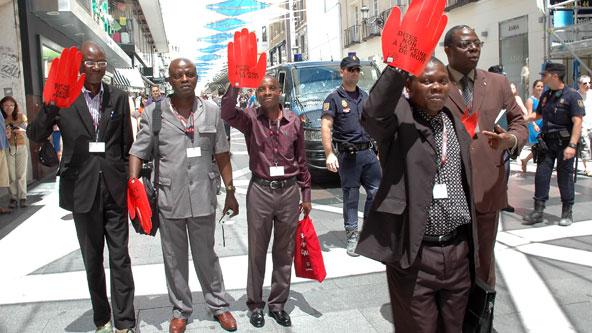
Article(s)
Tackling resistance to abolition in Africa
By Thomas Hubert, on 22 June 2013
While Africa has been the fastest region in abolishing capital punishment in recent years, lawyers from Uganda and Nigeria say they are facing increasing from the authorities to use the death penalty.
2013
Innocence
Nigeria
Terrorism
Uganda

Article(s)
Pakistan moratorium renewal welcomed
By Human Rights Commission of Pakistan, on 8 October 2013
The Human Rights Commission of Pakistan (HRCP), a World Coalition member organisation, has welcomed the federal government’s announcement on continuing the moratorium on capital punishment and has called for a thorough review of the death penalty regime in the country.
2013
Moratorium
Pakistan
Pakistan

Article(s)
California narrowly rejects abolition
By Thomas Hubert, on 8 November 2012
Citizens of the largest US state have voted against an initiative to replace the death penalty with life sentences, but the results show abolitionist views have gained significant ground through the referendum campaign.
2012
Public Opinion
United States

Article(s)
Singapore must stop targeting HR defenders and media
By Aliran et al (Malaysiakini), on 20 February 2020
We, the 37 undersigned groups and organisations, and three individuals, are appalled by Singapore’s denial and response to the highlighting of alleged “barbaric” unlawful practices in execution method that was highlighted vide a Jan 16 media statement issued by Lawyers for Liberty (LFL).get to many more people when media reports on our statements.
2020
Singapore
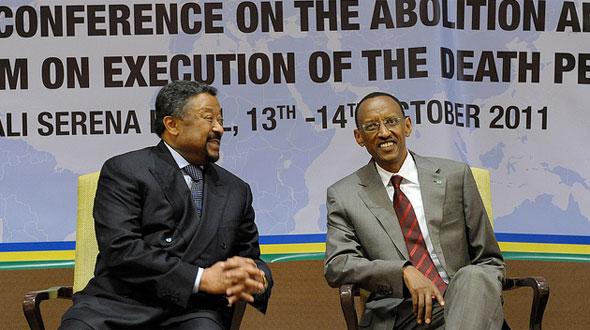
Article(s)
African countries discuss Rwandan example in abolition of the death penalty
on 22 October 2011
Kigali hosted the Inter-African conference against the death penalty on 13 and 14 October.
2011
Gabon
Public Opinion
Rwanda
Rwanda
Article(s)
Amnesty charts death penalty world map and vows to remove Belarus from it
on 25 March 2009
World Coalition member Amnesty International has released its annual statistics on the death penalty and launched a campaign against capital punishment in Belarus.
2009
Belarus
Belarus
China
Iran (Islamic Republic of)
Pakistan
Saudi Arabia
United States
Article(s)
From death row to elusive freedom
By Ron Keine, on 26 October 2010
Ron Keine, an exonerated former prisoner turned activist, shares his story so that the United States may one day join the rest of the civilized world in abolishing the death penalty.
2010
Death Row Conditions
Innocence
United States
Article(s)
From Italian prisons to Texas death row
on 27 March 2008
A conference held near Naples, Italy last month helped around 200 attendees, most of them secondary school students, understand the death penalty situation in the US and relate it to prison issues in their own country.
2008
Death Row Conditions
Italy
United States
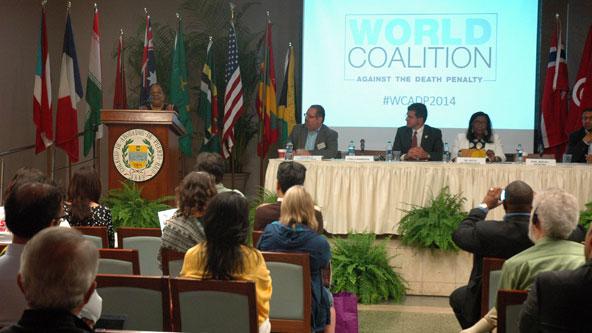
Article(s)
World Coalition raises mental health issues in administration of the death penalty
By Thomas Hubert (in San Juan, Puerto Rico), on 22 June 2014
World abolitionists gathered in Puerto Rico between 20-22 June to take stock on progress in the crucial Caribbean region and prepare for the next round of the fight against the death penalty.
2014
Puerto Rico
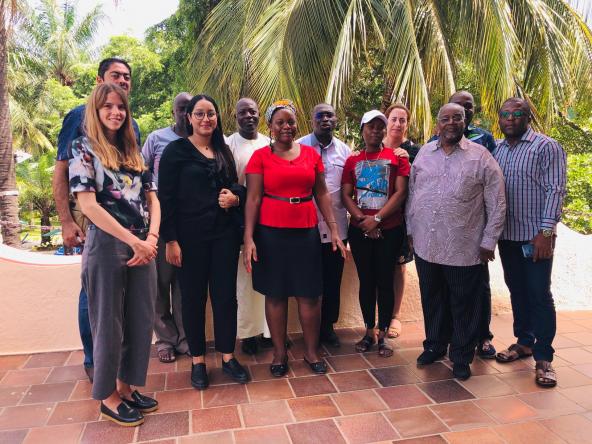
Article(s)
Children and the death penalty in Sub-Saharan Africa: NGO Forum and the 65th ACHPR Session
By Connie Numbi and Bronwyn Dudley, on 9 December 2019
The NGO Forum and the subsequent 65th ACHPR Session (African Commission on Human and People’s Rights) was held in Banjul, the Gambia from 17th October to the 10 November 2019.
2019
Juveniles

Article(s)
Second Optional Protocol: Frequently Asked Questions
By Pierre Desert, on 27 June 2008
What is it? How is it implemented? You will find the answers to the most frequently asked questions about the Second Optional Protocol below.
2008
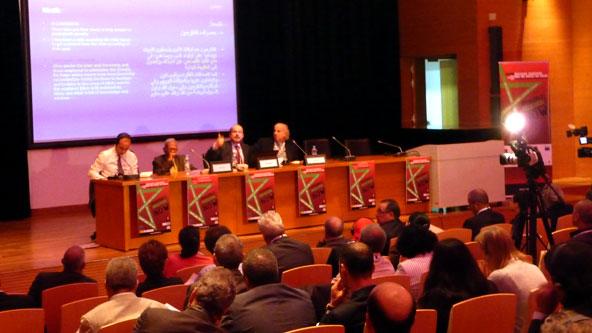
Article(s)
Abolitionists from the whole Arab World hold their first congress
By Aurélie Plaçais, on 22 October 2012
The Regional Congress on the Death Penalty held in Rabat, Morocco between 18-20 October highlighted the key role of civil society in pushing the abolitionist agenda in a region affected by deep changes.
2012
Algeria
Egypt
Jordan
Mauritania
Moratorium
Morocco
Public Opinion
Tunisia
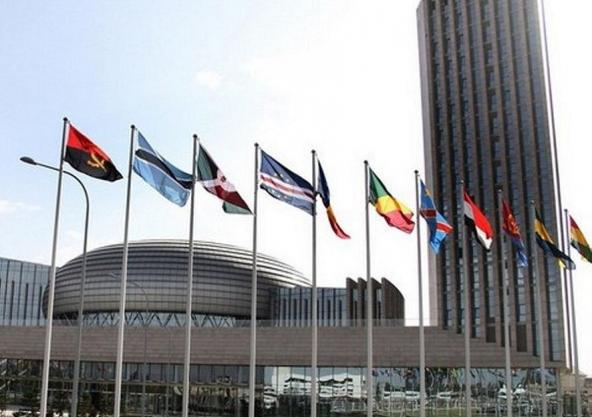
Article(s)
Awareness Building Workshop with African Union Members
By Bronwyn Dudley, on 14 May 2019
The end of March saw a first of its kind awareness-building workshop in Addis-Ababa, Ethiopia for the permanent French-speaking members to the African Union. Moderated by the ACHPR’s Working Group on the Death Penalty and Extrajudicial, Summary of Arbitrary Killings in Africa in close collaboration with FIACAT, the World Coalition and the Organisation International de la Francophonie (OIF), the training focused on raising awareness of the Draft Protocol on the Abolition of the Death Penalty.
2019
Document(s)
Estimating the effect of death penalty moratoriums on homicide rates using the synthetic control method
By Stephen N. Oliphant, on 18 September 2022
2022
Academic report
Moratorium
United States
More details See the document
Research examining death penalty deterrence has been characterized as inconclusive and uninformative. The present analysis heeds a recommendation from prior research to examine single-state changes in death penalty policy using the synthetic control method. Data from the years 1979–2019 were used to construct synthetic controls and estimate the effects of death penalty moratoriums on homicide rates in Illinois, New Jersey, Washington, and Pennsylvania. Moratoriums on capital punishment resulted in nonsignificant homicide reductions in all four states.
- Document type Academic report
- Countries list United States
- Themes list Moratorium
Article(s)
For ACATs, every executed person “is one of us”
on 22 January 2008
Wherever the Action by Christians for the Abolition of Torture (ACAT) is present, the struggle against the death penalty is an important element within their commitment to respect for human dignity.
2008
Benin
Democratic Republic of the Congo
Germany
Moratorium
Public Opinion
Spain
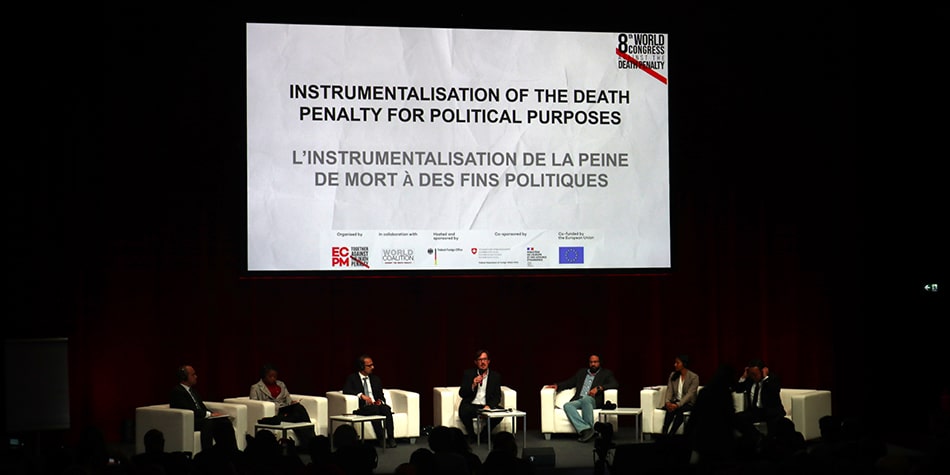
Article(s)
How the Death Penalty is Politicized: A Reflection on the 8th World Congress Against the Death Penalty
By Dunia Schaffa, on 27 January 2023
During the 8th World Congress Against the Death Penalty, in Berlin Germany, the phrase “the death penalty is being used as a political tool” was used frequently – in panels, in round tables, in speeches, even amongst the participants getting a coffee in between Congress events.
2023
Iran (Islamic Republic of)
United States
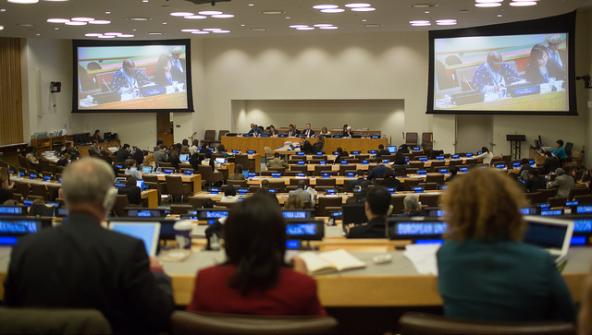
Article(s)
Call for Moratorium on Executions Gains Record-High Support at Committee Vote
By Amnesty International & Comunità di Sant'Egidio, on 16 November 2018
Today the international community offered unprecedented support to a UN call to halt executions when the Third Committee of the UN General Assembly considered a draft resolution on a moratorium on the use of the death penalty.
2018
Moratorium
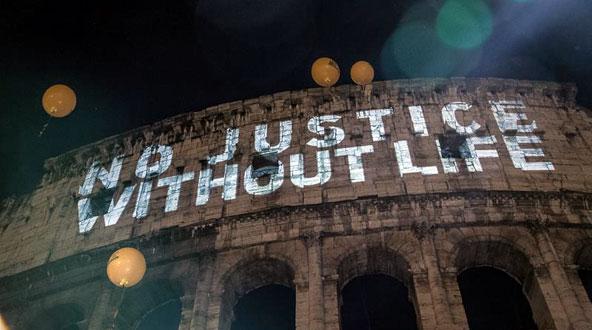
Article(s)
Justice ministers meet as Colosseum lights up to say yes to life
By Community of Sant'Egidio, on 10 December 2012
The Community of Sant’Egidio conducted a crucial political networking exercise in favour of abolition in Rome at the end of November before 1,600 cities lit up their monuments against the death penalty.
2012
Benin
Burundi
Central African Republic
France
Gabon
Italy
Kazakhstan
Kyrgyzstan
Mongolia
Public Opinion
Switzerland
Togo
United States
Uzbekistan
Zimbabwe

Article(s)
Terrorism is no excuse for unfair trials in Iraq
By Elisa Belotti, on 25 November 2015
Earlier in November, the UN Human Rights Committee released its concluding observations on Iraq’s implementation of the International Covenant on Civil and Political Rights. The Committee and civil society’s representatives specifically dwelled on Iraq’s application of the death penalty.
2015
Fair Trial
Iraq
Iraq
Terrorism

Article(s)
How Business May Contribute to Universal Abolition
By Louis Linel, on 29 January 2021
Non-governmental organizations (NGOs) have long been at the forefront of the movement for human dignity, as the main, highly-specialized – and sometimes isolated– champions for social justice. However, a new generation of advocates from the private sector, whose primary center of interest or area of expertise seems disconnected from international human rights standards, has been […]
2021
Public Opinion
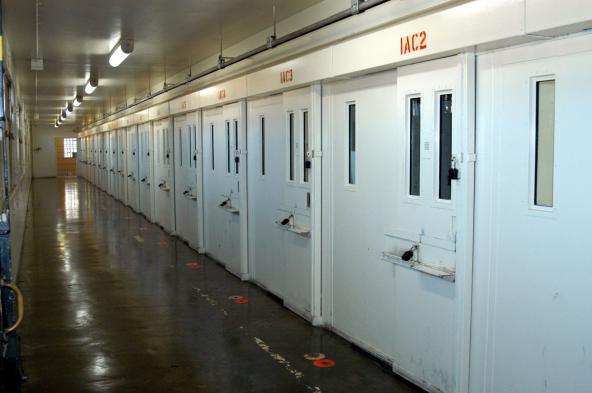
Article(s)
Abolitionists support death row survivors
By Thalia Gerzso, on 14 November 2017
On October 26, abolitionists all around the world celebrated the release of Cheng Hsing-Tse, originally sentenced to death in 2006. This successful outcome highlights the work of numerous organizationss which assist death row survivors.
2017
Innocence
Murder Victims' Families
Article(s)
UAE use of death penalty raises “grave concerns”
on 7 May 2010
In a letter to the United Arab Emirates’ justice minister, the World Coalition denounced the growing number of death sentences handed down in the country, especially after unfair trials or against juvenile offenders.
2010
Fair Trial
Juveniles
United Arab Emirates

Article(s)
Community of Sant’Egidio Calls for Universal Abolition with Cities for Life, Cities Against the Death Penalty
By Louis Linel, on 8 December 2020
The discussion was chaired by Mario Marazitti, who stood in front of broadcasted live images of the light-draped Colosseum in Rome, Italy, displaying the slogan of this international key event, “No Justice Without Life”.
2020
Italy
Malaysia
Public Opinion
United States

Article(s)
Saudi Arabian Mass execution of 81 men
By Anissa Aguedal, World Coalition Against the Death Penalty, on 4 April 2022
Saudi Arabia: the largest mass execution in this country in years The kingdom of Saudi Arabia executed 81 men on March 12, 2022, all of whom had been convicted of a wide range of offences, including “terrorism”- related crimes, murder, armed robbery, and arms smuggling. Those put to death included seven Yemenis, one Syrian and […]
2022
Moratorium
Public Opinion
Saudi Arabia
Article(s)
Jamaica vote illustrates retentionist trend in the Caribbean
on 9 January 2009
Jamaican lawmakers voted to keep capital punishment and the government seems determined to use it. Caribbean abolitionists are battling similar moves across the region.
2009
Jamaica
Public Opinion
Saint Kitts and Nevis

Article(s)
Why Jordan resumed executing people on the death row?
By Hend Hanafy, Faculty of Law, University of Cambridge, on 18 April 2018
For eight years since June 2006, Jordan was adopting a moratorium on the death penalty. However, on the 21st of December 2014, 11 people were hung in Swaqa Prison, thus, triggering questions about the timing and the reasons behind the resumption of the death penalty in Jordan. It is arguable that the internal political pressures on the government have fuelled this setback which was further eased through the international political opportunity of Jordan’s role in the war on terrorism.
2018
Jordan
Article(s)
Taiwan visit raises hopes of local abolitionists
on 9 July 2008
A recent visit to Taiwan by a joint World Coalition-ADPAN delegation left the impression that the Asian island was on course to “join a global trend towards abolition of the death penalty”, as was reported in the local media.
2008
Public Opinion
Taiwan
Taiwan
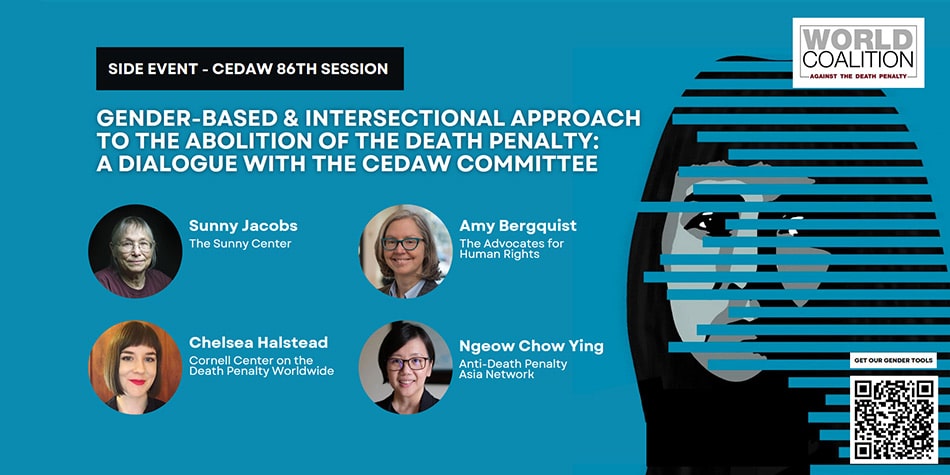
Article(s)
CEDAW experts welcome World Coalition members in the #CEDAW86 side event on gender and the death penalty
By Venus Aves, on 8 November 2023
On 22 October 2023, the World Coalition Against the Death Penalty (World Coalition) organized a closed-door side event on a gender-based and intersectional approach to abolition as part of the 86th session of the Committee on the Elimination of Discrimination Against Women (CEDAW).
2023
Gender
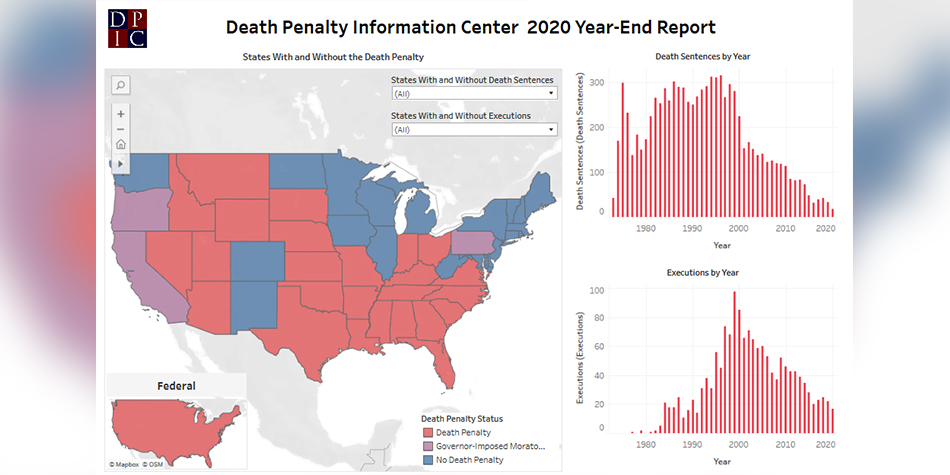
Article(s)
DPIC’s Report on the 2020 Death Penalty Usage in the US
By Louis Linel, on 6 January 2021
TheDeath Penalty Information Center’s 2020 annual report highlights the continuing trend toward abolition in the US and the resumption of federal executions in a challenging COVID-19 context.
2021
United States
Document(s)
Living with a Death Sentence in Kenya: Prisoners’ Experiences of Crime, Punishment and Death Row
By Carolyn Hoyle and Lucrezia Rizzelli, on 24 January 2023
2023
Book
Kenya
More details See the document
The Death Penalty Project’s latest report provides a comprehensive analysis of the lives of prisoners on death row in Kenya. It focuses on prisoners’ socio-economic backgrounds and profiles, their pathways to, and motivation for, offending, as well as their experiences of the criminal justice process and of imprisonment. It complements our previous research, a two-part study of attitudes towards the death penalty in Kenya, The Death Penalty in Kenya: A Punishment that has Died Out in Practice.
While 120 countries around the world have now abolished the death penalty, including 25 in Africa, Kenya is one of 22 African nations that continues to retain the death penalty in law, albeit it has not carried out any executions for more than three decades. As such, Kenya is classified as ‘abolitionist de facto’, the United Nations term for a country that has not carried out an execution for at least 10 years. Yet, while state-sanctioned executions no longer occur, hundreds of people are currently living under sentence of death and others are convicted and sentenced to death each year. As long as the death penalty is retained in law, there remains a risk that executions might resume if there is political change. Moreover, the plight and turmoil of those languishing on death row – consistently the poorest and most vulnerable – cannot be ignored. They are disproportionately sentenced to death and suffer the harshest punishments and treatment.
- Document type Book
- Countries list Kenya
Article(s)
Clever use of online tools could boost activism
on 28 February 2010
Kathy Brown, an English IT specialist, is not the typical anti-death penalty campaigner. She is not an NGO-registered lawyer nor a political science student. But through the internet, she has become active in the global abolitionist community.
2010
China
Drug Offenses
Mental Illness
Article(s)
US Supreme Court revives “failed” death penalty
on 17 April 2008
The World Coalition condemns the April 16th decision of the United States Supreme Court upholding the lethal injection as a humane method of executing a human being.
2008
Moratorium
United States
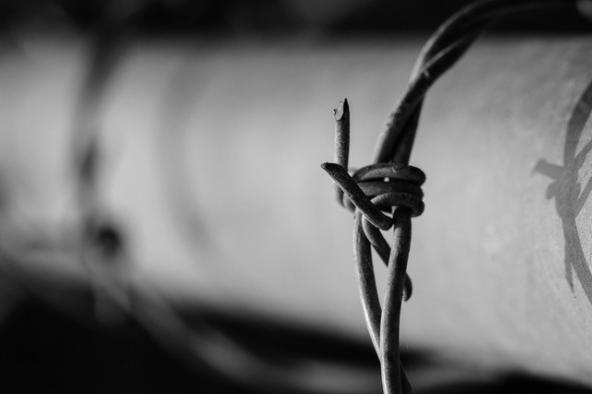
Article(s)
No mention of death row prisoners in Mandela rules
By Nordine Drici (Planète Réfugiés) & Sandrine Ageorges-Skinner (ECPM), on 30 November 2018
Commemorating the 70th anniversary of the Universal Declaration of Human Rights on 10 December 2018 is an opportunity to question the effectiveness of civil and political rights, but also economic, social and cultural rights, in the context of an increasingly globalized world that ostracizes, excludes, sentences to death and continues to execute.
2018
Death Row Conditions
Article(s)
Bad press for China after Briton’s execution
on 10 January 2010
Bitter criticism has been targeting China since the execution of British national Akmal Shaikh in the Chinese province of Xinjiang on December 29 after he was found guilty of transporting drugs.
2010
China
Mental Illness
United Kingdom
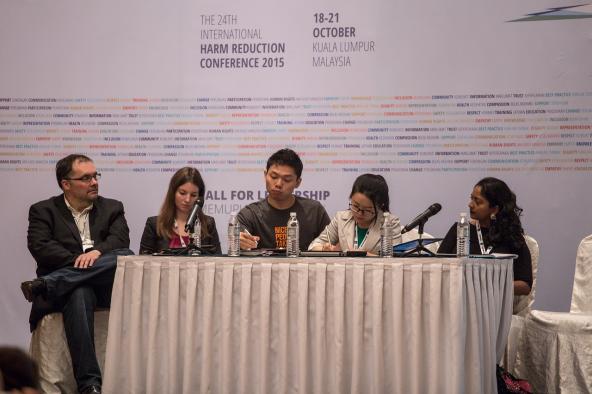
Article(s)
The death penalty for drugs must go, it has no place in a civilised society
By Aurélie Plaçais, on 21 October 2015
Those were the words of Anand Grover, former UN Special Rapporteur on the right to health during the opening ceremony of Harm Reduction International’s 24th conference in Kuala Lumpur, Malaysia.
2015
China
Drug Offenses
India
Indonesia
Malaysia
Article(s)
Interview: Pakistan on its way to a moratorium?
on 25 July 2008
Pakistan’s new government has called on all death sentences in the country to be commuted to life imprisonment. Pakistani lawyer and human rights defender Kamran Arif believes a moratorium is at hand.
2008
Clemency
Moratorium
Pakistan
Pakistan

Article(s)
Call for tenders for an external final evaluation
By World Coalition Against the Death Penalty, on 15 June 2021
External Evaluation of the project “Preventing the risk of resurgence of the death penalty in three abolitionist countries” of 36 months in the Maldives, Philippines and Turkey
2021
Maldives
Philippines
Turkey

Article(s)
Glossary of the Second Optional Protocol
By Pierre Désert, on 25 June 2008
From “Acceptance” to “Treaty”, discover the vocabulary of international law and get a clearer picture of the Second Optional Protocol.
2008
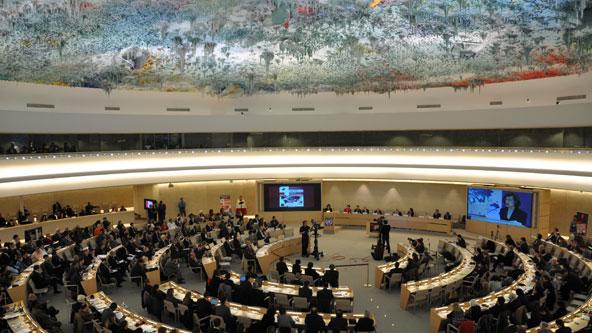
Article(s)
Discussing the Death Penalty for Drug Crimes at the Human Rights Council
By Elisa Bellotti, on 30 September 2015
The Advocates for Human Rights and Together against the Death Penalty (ECPM), in partnership with other members of the World Coalition, organized a Round Table on the issue of the death penalty for drug-related crimes. The event took place during the 30th Session of the UN Human Rights Council, on September 28, 2015.
2015
Drug Offenses
Article(s)
Abolition on the agenda of the National Assembly in DR Congo
on 6 November 2010
The death penalty issue is back on the parliamentary agenda in the Democratic Republic of Congo thanks to a legislative sequence welcomed by local abolitionists.
2010
Democratic Republic of the Congo
Article(s)
Spain and world academics join forces against the death penalty
on 22 December 2009
Spanish President José Luis Zapatero attended the international abolitionist colloquium during which the Academic Network against the Death Penalty was launched.
2009
Benin
Chile
France
Mental Illness
Spain
Women
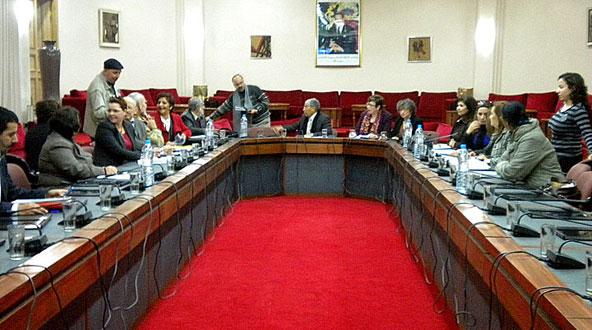
Article(s)
Moroccan parliamentary network a new step towards abolition
By Delphine Judith, on 15 March 2013
Around 180 MPs from all political hues signed the founding charter of their network against the death penalty, which promises sustained legislative action in favour of abolition.
2013
Cruel, Inhuman and Degrading Treatment and Punishment
Moratorium
Morocco
Article(s)
Mental illness and the death penalty: a painful intersection
on 28 May 2008
Two leading American grassroots organisations have come together to raise awareness about the execution of mentally ill defendants.
2008
Mental Illness
Murder Victims' Families
United States
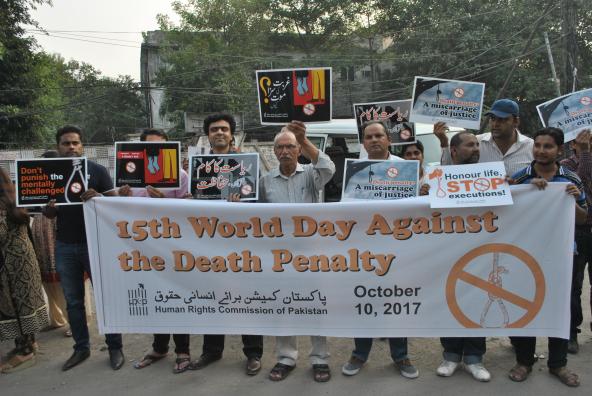
Article(s)
Abolitionists fight against the abusive use of the death penalty
By Thalia Gerzso, on 28 November 2017
In October 2017, Pakistan has agreed to initiate efforts to narrow down the scope of the death penalty. This first step is the result of a strong mobilization from Pakistani and international organizations, in particular during World Day.
2017
Pakistan
Public Opinion
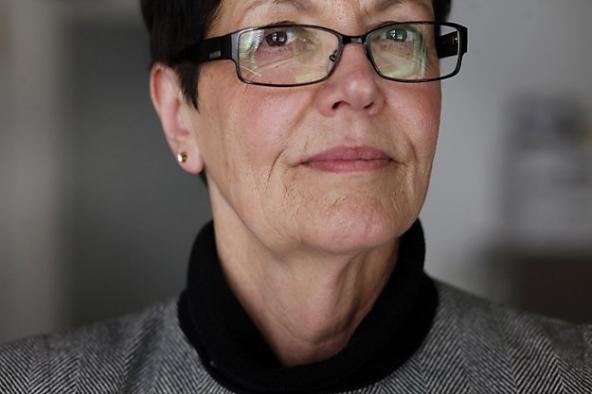
Article(s)
Former death row warden turns frontline abolitionist
on 6 June 2011
Jeanne Woodford, who used to oversee excutions in California, has become the executive director of the prominent anti-capital punishment organisation Death Penalty Focus.
2011
Death Row Conditions
Public Opinion
United States
Article(s)
Abolitionists block Nigerian executions
on 9 July 2010
Legal action by local activists and pressure from international organizations have succeeded in stopping plans by Nigeria’s authorities to execute hundreds of death row inmates.
2010
Fair Trial
Innocence
Legal Representation
Moratorium
Nigeria
Nigeria
Terrorism
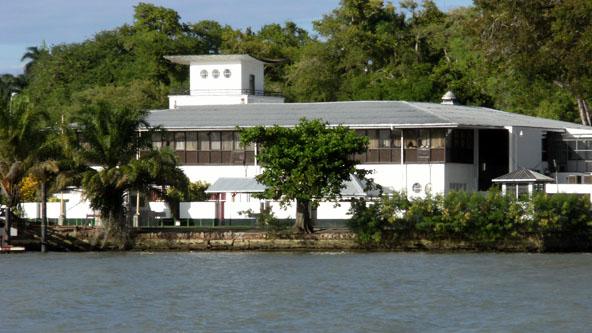
Article(s)
Capital punishment abolished in Suriname
By Parliamentarians for Global Action, on 6 March 2015
The Parliament of Suriname (photo) has abolished the death penalty in law, setting an example for the Greater Caribbean – a major front line in the global fight against capital punishment. World Coalition member organisation Parliamentarians for Global Action provided crucial support for abolition in Suriname.
2015
Suriname
Suriname

Article(s)
Discussion at the Human Rights Council of human rights violations related to the use of the death penalty
By Jessica Corredor, on 7 March 2017
From Zeid Ra’ad Al Hussein, United Nations High Commissioner for Human Rights, to abolitionist and retentionist government representatives and World Coalition members, participants to the Biennial high-level discussion on death penalty exchanged views in order to address human rights violations related to the use of the death penalty, in particular with respect to the prohibition of torture.
2017
Cruel, Inhuman and Degrading Treatment and Punishment
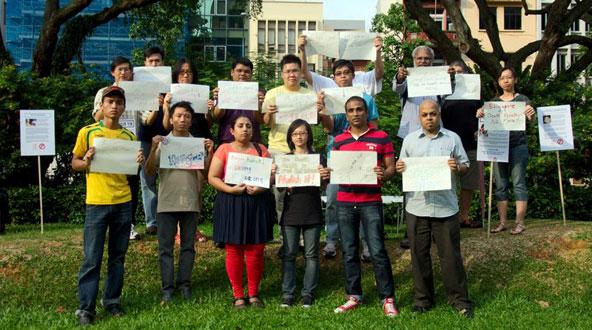
Article(s)
Migrant workers facing capital punishment show need for alternative sentences
By Think Centre, on 26 April 2012
Four Singapore-based organisations denounce the high risk of miscarriage of justice in recent death sentences handed down on poor immigrants and calls for the abolition of the death penalty in the city-state.
2012
Cruel, Inhuman and Degrading Treatment and Punishment
Moratorium
Singapore
Article(s)
Second Optional Protocol: An irreversible mechanism for abolishing the death penalty” – Denys Robiliard
on 7 September 2020
Denys Robiliard, a lawyer and former president of Amnesty International’s French section, details why the Second Optional protocol to the UN’s ICCPR is an crucial instrument to push the abolition of the death penalty worldwide.
2020
Afghanistan

Article(s)
Death Penalty in India in 2017
By National Law University, Delhi, center of the death penalty, on 26 March 2018
A report describing the use of the death penalty in India in 2017 in comparison with 2016 was recently released by the National Law University’s Death Penalty Research Project (based in New Delhi).
2018
India
Member(s)
Mêmes droits pour tous (MDT)
on 30 April 2020
Les Mêmes Droits pour Tous (MDT) is a Guinean organization from the civil society. It has been created by Order No. 3242/MATD/CAB/SACCO of 26 May 2006. Since then, MDT has been actively involved in the defence and promotion of human rights in Guinea. MDT specializes in the field of criminal justice. To date, MDT acts in […]
2020
Guinea
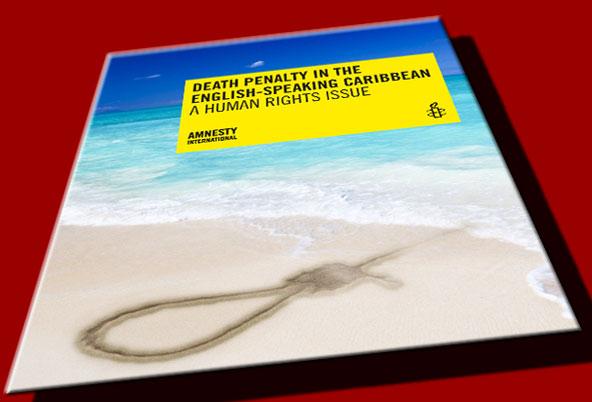
Article(s)
Call to end flawed Caribbean death penalty
By Thomas Hubert, on 10 December 2012
An appeal signed by local organizations and a new report by Amnesty International denounce multiple human rights violations in the use of capital punishment in the region and ask governments to “remove the death penalty once and for all from the law books”.
2012
Antigua and Barbuda
Bahamas
Barbados
Belize
Dominica
Fair Trial
Grenada
Guyana
Intellectual Disability
Jamaica
Mental Illness
Saint Kitts and Nevis
Saint Lucia
Saint Vincent and the Grenadines
Trinidad and Tobago
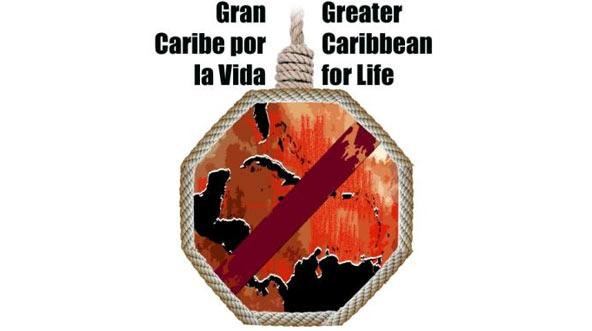
Article(s)
Caribbean Conference – The Death Penalty in the Context of Public Security: Neither Right, Nor Effective
By Greater Caribbean For Life, on 9 September 2013
To celebrate the 11th World Day Against the Death Penalty dedicated to the Greater Caribbean, a regional conference is organised by local civil society in Trinidad and Tobago on October, 1st.
2013
Public Opinion
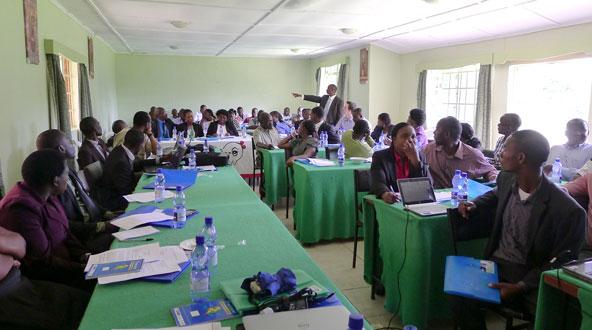
Article(s)
Mental health seminar takes Malawi a step closer to resentencings
By Emile Carreau, on 28 January 2015
The Malawi Human Rights Commission (MHRC) held a two-day seminar on mental health evaluations in preparation for the resentencing of nearly 200 individuals after their mandatory death sentences were deemed unconstitutional.
2015
Malawi
Malawi
Mental Illness

Article(s)
Progressing towards abolition in East Africa
on 7 August 2011
On 24-27 July, 2011, World Coalition members Penal Reform International (PRI), Foundation for Human Rights Initiative (FHRI) and the International Commission of Jurists-Kenya section (ICJ), jointly hosted a regional roundtable on “Death Penalty in East Africa: Challenges, Strategies and Comparative Jurisprudence”, with the Judicial Studies Institute (JSI) in Nairobi, Kenya.
2011
Death Row Conditions
Fair Trial
Kenya

Article(s)
Progress and impediments on path to abolition in U.S.
By Russ Feingold & Christopher Wright Durocher, on 3 April 2024
When President Biden won the 2020 election, he became the first successful U.S. presidential candidate to publicly oppose the death penalty.
2024
United States
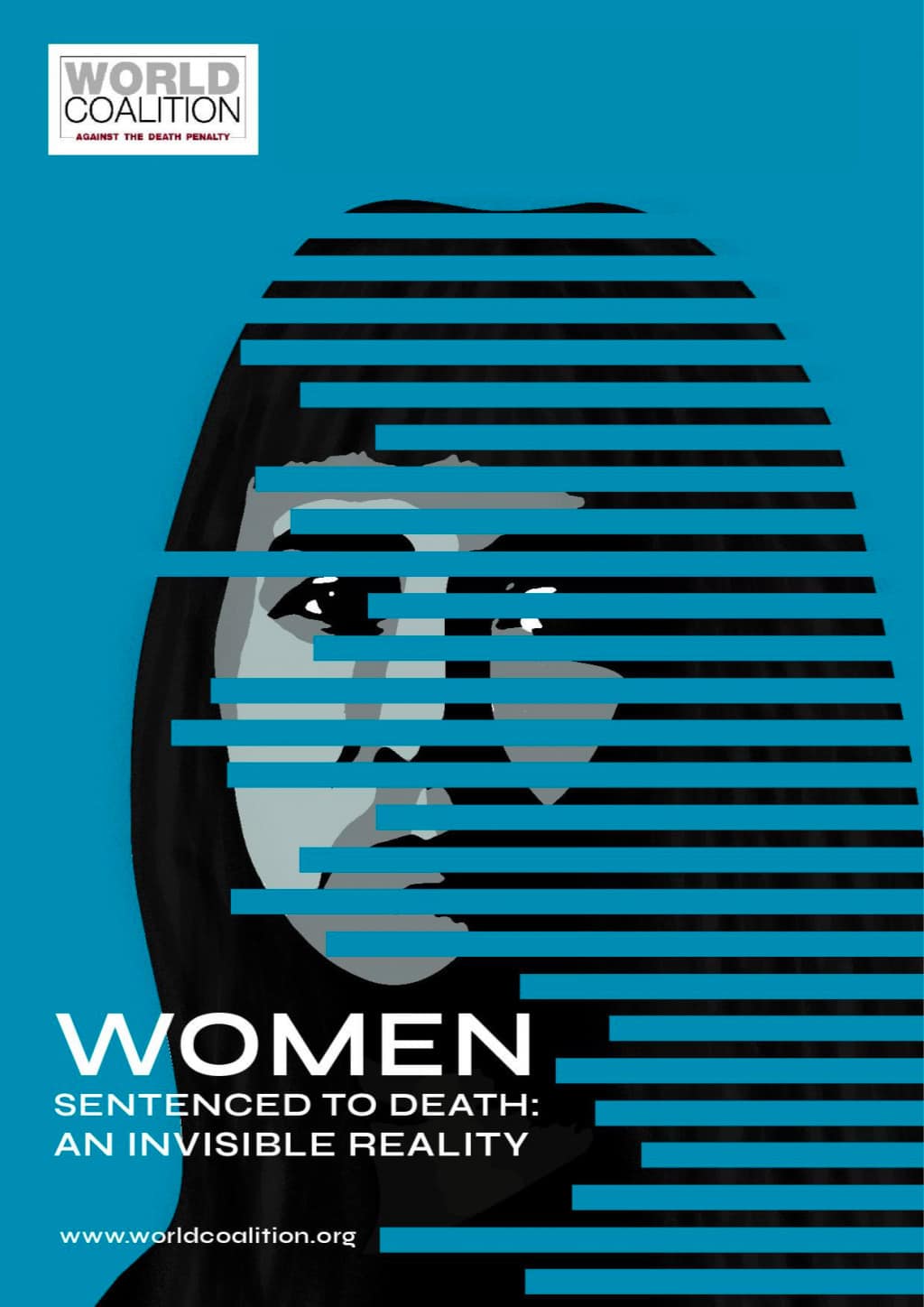
Making gender discrimination in capital punishment visible
on 6 March 2023
Understanding the link between gender discrimination and the death penalty – Women and the death penalty – Gender and sexual minorities and the death penalty Gender and the Death Penalty at the World Coalition – Strengthen the capacity of civil society organizations – Strengthen links with women’s, gender and sexual minority rights movements and organizations […]
2023
Gender
Women

Article(s)
Joint Open Letter to the Minister of Justice of Malawi on the abolition of the death penalty
By World Coalition Against the Death Penalty, on 26 July 2024
Dear Minister of Justice, Honorable Titus Mvalo Ahead of this joint letter, the World Coalition Against the Death Penalty would like to express its deepest condolences to the Government and people of Malawi for the passing of Vice President Mr. Saulos Chilima on 11 June 2024.
2024
Malawi

Article(s)
Singapore: Authorities must end executions and stop targeting anti-death penalty activists to curb criticism
By World Coalition Against the Death Penalty, on 28 August 2024
We, the undersigned seven organizations, are gravely concerned by developments in Singapore since the beginning of August 2024, which has seen the authorities carry out two executions in violation of international safeguards on the death penalty, as well as limiting the right to freedom of expression of the Transformative Justice Collective, a non-governmental organization who […]
2024
Singapore
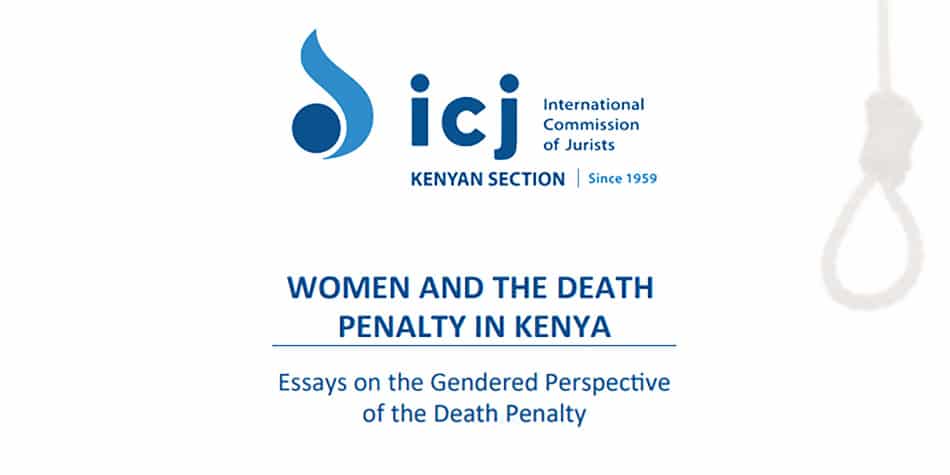
Article(s)
ICJ Kenya Makes Gender Discrimination in Capital Punishment Visible
By World coalition against the death penalty, on 8 March 2024
Kenya is one of a few target countries for the World Coalition Against the Death Penalty’s “Gender and the Death Penalty” campaign; a campaign that is being conducted in collaboration with its member organisations in the country, namely the Kenyan Section of the International Commission of Jurists (ICJ Kenya) and the Kenya Human Rights Commission.
2024
Gender
Gender
Kenya
Kenya

Article(s)
Women sentenced to death: An invisible reality
By Advocates for Human Rights, International Federation of ACAT (Action by Christians for the Abolition of Torture), International Harm Reduction Association (IHRA), non-governmental organizations in special consultative status, on 4 August 2021
The World Coalition Against the Death Penalty and supporting member organizations welcome the annual full-day meeting to discuss the human rights of women under resolution 6/30.
2021
Drug Offenses
Fair Trial
Women

Article(s)
Violations of the Right to Life in the Context of Drug Policies
By International Harm Reduction Association (IHRA), Corporación ATS Acción Técnica Social, IDPC Consortium, Washington Office on Latin America, non-governmental organizations in special consultative status, Anti-Death Penalty Asia Network (ADPAN); Capital Punishment Justice Project (CPJP); Centre on Drug Policy Evaluation (CDPE); Cornell Centre on the Death Penalty Worldwide; Eleos Justice - Monash University; Instituto RIA, AC; Iran Human Rights (IHR); World Coalition Against the Death Penalty., NGO(s) without consultative status, also share the views expressed in this statement, on 10 August 2021
Harm Reduction International and co-signatories congratulate Mr Tidball-Binz on his appointment as Special Rapporteur on summary executions. With this statement, we highlight key violations of the right to life enabled by repressive drug policies or reported in the context of drug law enforcement; and encourage this Rapporteur to pay specific attention to the impact of […]
2021
Death Row Conditions
Drug Offenses
Fair Trial

